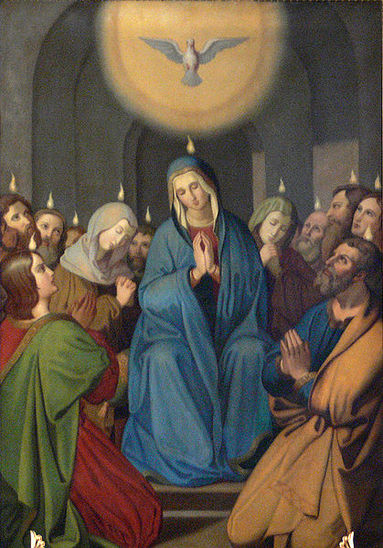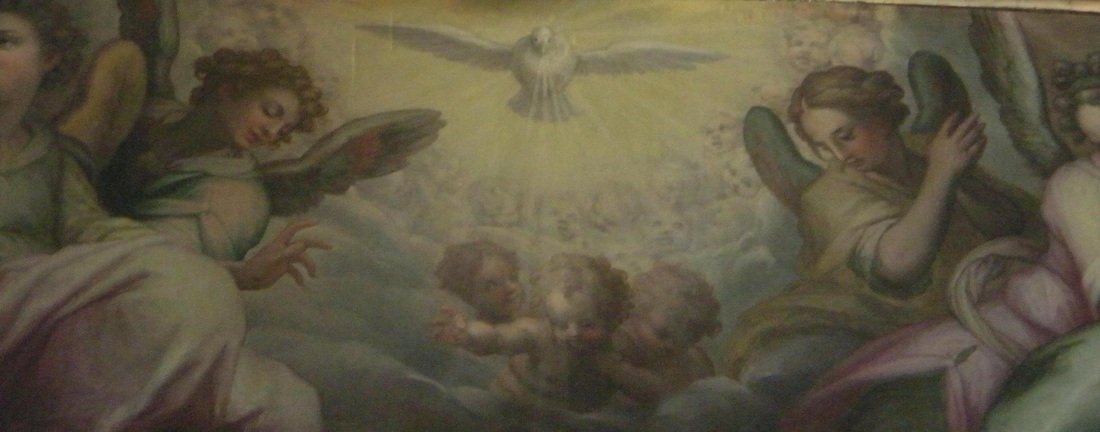
"When the time for Pentecost was fulfilled,
they were all in one place together.
And suddenly there came from the sky a noise like a strong driving wind, and it filled the entire house in which they were.
Then there appeared to them tongues as of fire,
which parted and came to rest on each one of them.
And they were all filled with the Holy Spirit
and began to speak in different tongues,
as the Spirit enabled them to proclaim." - Acts 2: 1-4
The Birth of the Church
The Bible records the story of Pentecost in Acts chapter 2.
Pope Francis taught about what happened on Pentecost:
"But what happened on that day, so distant from us and yet so close as to touch the very depths of our hearts? Luke gives us the answer in the passage of the Acts of the Apostles which we have heard (2:1-11). The evangelist brings us back to Jerusalem, to the Upper Room where the apostles were gathered. The first element which draws our attention is the sound which suddenly came from heaven like the rush of a violent wind, and filled the house; then the tongues as of fire which divided and came to rest on each of the apostles. Sound and tongues of fire: these are clear, concrete signs which touch the apostles not only from without but also within: deep in their minds and hearts. As a result, all of them were filled with the Holy Spirit, who unleashed his irresistible power with amazing consequences: they all began to speak in different languages, as the Spirit gave them ability. A completely unexpected scene opens up before our eyes: a great crowd gathers, astonished because each one heard the apostles speaking in his own language." - Pope Francis, homily at Pentecost Mass, May 19, 2013
Pope Benedict XVI taught about what happened on Pentecost:
"The Church throughout the world relives to today the Solemnity of Pentecost, the mystery of her own birth, of her own "baptism" in the Holy Spirit (cf. Acts 1:5), which took place in Jerusalem, 50 days after Easter, precisely on the Jewish feast of Pentecost. The risen Jesus told his disciples: "Remain in the city until you are given power from on high" (Luke 24:49). This happened in a perceptible way in the Cenacle, while they were gathered together with Mary, the Virgin Mother, in prayer. As we read in the Acts of the Apostles, suddenly that place was invaded by a strong driving wind, and tongues like fire came to rest on the heads of all those present. The Apostles went out then and began to proclaim in different languages that Jesus is the Christ, the Son of God, dead and risen (cf. Acts 2:1-4). The Holy Spirit, who with the Father and the Son created the universe, guided the history of the people of Israel and spoke through the prophets, who in the fullness of time cooperated in our redemption, who at Pentecost descended upon the nascent Church and made it missionary, sending it to proclaim to all peoples the victory of divine love over sin and death." - Pope Benedict XVI, May 31, 2009
Mary's Role on Pentecost
The Bible singles out the Virgin Mary as having a special role on Pentecost because it specifically names her and the Apostles in Acts 1:13-14 as being united in prayer for the Holy Spirit.
Pope Benedict XVI taught us to be like the early Church, open to receive the benefit of her prayers which she lifts up to God in Heaven. He taught the significance of this on Pentecost Sunday, May 27, 2007 in Rome, saying, "Dear brothers and sisters, the first Pentecost took place when Mary Most Holy was present amid the disciples in the Upper Room in Jerusalem and prayed. Today, too, let us entrust ourselves to her maternal intercession, so that the Holy Spirit may descend in abundance upon the Church in our day, fill the hearts of all the faithful and enkindle in them the fire of his love."
Pentecost Continues
"And the Church continues to live on that same strength which enabled it to begin and to grow. Pentecost is the original event but also a permanent dynamism" - Pope Benedict XVI, Homily, October 10, 2010
"In the midst of the problems, disappointments and hopes, desertions and returns of these times of ours, the Church remains faithful to the mystery of her birth. While it is an historical fact that the Church came forth from the Upper Room on the day of Pentecost, in a certain sense one can say that she has never left it. Spiritually the event of Pentecost does not belong only to the past: the Church is always in the Upper Room that she bears in her heart. The Church perseveres in preserves, like the Apostles together with Mary, the Mother of Christ, and with those who in Jerusalem were the first seed of the Christian community and who awaited in prayer the coming of the Holy Spirit." - Pope John Paul II, Dominum Et Vivificantem, May 18, 1986
Following the example of the early Church after Jesus ascended to Heaven, many Christians pray the Novena to the Holy Spirit during nine days between Ascension and Pentecost.
they were all in one place together.
And suddenly there came from the sky a noise like a strong driving wind, and it filled the entire house in which they were.
Then there appeared to them tongues as of fire,
which parted and came to rest on each one of them.
And they were all filled with the Holy Spirit
and began to speak in different tongues,
as the Spirit enabled them to proclaim." - Acts 2: 1-4
The Birth of the Church
The Bible records the story of Pentecost in Acts chapter 2.
Pope Francis taught about what happened on Pentecost:
"But what happened on that day, so distant from us and yet so close as to touch the very depths of our hearts? Luke gives us the answer in the passage of the Acts of the Apostles which we have heard (2:1-11). The evangelist brings us back to Jerusalem, to the Upper Room where the apostles were gathered. The first element which draws our attention is the sound which suddenly came from heaven like the rush of a violent wind, and filled the house; then the tongues as of fire which divided and came to rest on each of the apostles. Sound and tongues of fire: these are clear, concrete signs which touch the apostles not only from without but also within: deep in their minds and hearts. As a result, all of them were filled with the Holy Spirit, who unleashed his irresistible power with amazing consequences: they all began to speak in different languages, as the Spirit gave them ability. A completely unexpected scene opens up before our eyes: a great crowd gathers, astonished because each one heard the apostles speaking in his own language." - Pope Francis, homily at Pentecost Mass, May 19, 2013
Pope Benedict XVI taught about what happened on Pentecost:
"The Church throughout the world relives to today the Solemnity of Pentecost, the mystery of her own birth, of her own "baptism" in the Holy Spirit (cf. Acts 1:5), which took place in Jerusalem, 50 days after Easter, precisely on the Jewish feast of Pentecost. The risen Jesus told his disciples: "Remain in the city until you are given power from on high" (Luke 24:49). This happened in a perceptible way in the Cenacle, while they were gathered together with Mary, the Virgin Mother, in prayer. As we read in the Acts of the Apostles, suddenly that place was invaded by a strong driving wind, and tongues like fire came to rest on the heads of all those present. The Apostles went out then and began to proclaim in different languages that Jesus is the Christ, the Son of God, dead and risen (cf. Acts 2:1-4). The Holy Spirit, who with the Father and the Son created the universe, guided the history of the people of Israel and spoke through the prophets, who in the fullness of time cooperated in our redemption, who at Pentecost descended upon the nascent Church and made it missionary, sending it to proclaim to all peoples the victory of divine love over sin and death." - Pope Benedict XVI, May 31, 2009
Mary's Role on Pentecost
The Bible singles out the Virgin Mary as having a special role on Pentecost because it specifically names her and the Apostles in Acts 1:13-14 as being united in prayer for the Holy Spirit.
Pope Benedict XVI taught us to be like the early Church, open to receive the benefit of her prayers which she lifts up to God in Heaven. He taught the significance of this on Pentecost Sunday, May 27, 2007 in Rome, saying, "Dear brothers and sisters, the first Pentecost took place when Mary Most Holy was present amid the disciples in the Upper Room in Jerusalem and prayed. Today, too, let us entrust ourselves to her maternal intercession, so that the Holy Spirit may descend in abundance upon the Church in our day, fill the hearts of all the faithful and enkindle in them the fire of his love."
Pentecost Continues
"And the Church continues to live on that same strength which enabled it to begin and to grow. Pentecost is the original event but also a permanent dynamism" - Pope Benedict XVI, Homily, October 10, 2010
"In the midst of the problems, disappointments and hopes, desertions and returns of these times of ours, the Church remains faithful to the mystery of her birth. While it is an historical fact that the Church came forth from the Upper Room on the day of Pentecost, in a certain sense one can say that she has never left it. Spiritually the event of Pentecost does not belong only to the past: the Church is always in the Upper Room that she bears in her heart. The Church perseveres in preserves, like the Apostles together with Mary, the Mother of Christ, and with those who in Jerusalem were the first seed of the Christian community and who awaited in prayer the coming of the Holy Spirit." - Pope John Paul II, Dominum Et Vivificantem, May 18, 1986
Following the example of the early Church after Jesus ascended to Heaven, many Christians pray the Novena to the Holy Spirit during nine days between Ascension and Pentecost.
